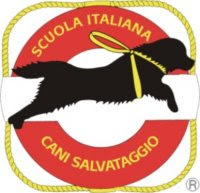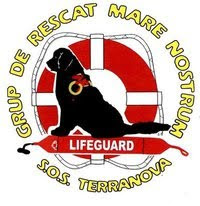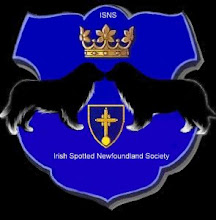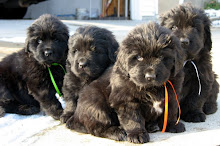
From the Newfoundland Club of America:
Finding and Evaluating a Breeder
"Finding the right breeder can be the most important step you take in selecting your Newfoundland puppy. For this reason, the NCA offers the following suggestions:
* Talk and visit with many breeders
* Be prepared to wait for a puppy
* Expect a written contract and a health guarantee
* Request references
* Documents that should come with your puppy
Talk to, and visit with as many breeders as possible, even if it means a long drive. This will enable you to meet the breeder and see the conditions in his kennel. Although elaborate equipment is not a necessity, the facilities can and should be clean. To be healthy, the puppies should be kept clean at all times with a warm dry pen, clean papers on the floor, and a clean bedding area. Ask to see the mother and the father of the puppies. Keep in mind that many times the father will not be on the premises, but the breeder should offer information about him. Also, the mother might not look her very best; taking care of pups is hard work.
It is not unusual to have to wait six months for your Newf puppy from a breeder. Quality is worth waiting for. A Newfoundland puppy should never go to a new home before the age of 8 weeks. Usually, by 8-12 weeks, a puppy has been checked for possible hereditary defects, received initial vaccinations and wormings, and is ready for his new family. Reputable breeders have written sales contracts and health guarantees. As with any contract or agreement, these should be read carefully and discussed in detail with the breeder before signing. Most breeders will offer a contract or agreement concerning puppies crippled with hip dysplasia or found to have a heart defect. Such contracts or agreements may also cover neutering, or the care
required to be provided by the buyer. Newfoundlands are subject to heart defects, hereditary in
nature, and should be examined by a veterinarian for such before being placed in a new home. No
bloodline is absolutely free of all hereditary problems, but a breeder should be ready to openly discuss any dogs in his kennel and their pedigrees as they are affected, for example by hip dysplasia and heart defects. A good breeder will be happy to supply you with references of satisfied customers. In return, the breeder may ask you for references such as your veterinarian. He will also question you about your lifestyle, why you want a Newf, and your own facilities for a Newfoundland. He would be rightfully concerned if you do not have a securely fenced yard or kennel run with appropriate shelter.
A Newf puppy should come with the following information:
• an AKC Registration application, properly completed and signed
• a pedigree of 3 or more generations
• written instructions on the feeding and care of the puppy
• an immunization record and schedule including date and type of serum, and dates future
inoculations are due
• a worming record and schedule
• a written sales contract and guarantee stipulating all terms and conditions of the sale
including when and what health defects the puppy has been examined and is guaranteed for.
Finding the right puppy and breeder for you, is often time consuming and difficult. Once
found, you will have friends for life! Take your time; a few months spent in your search will
be well worth it.
Checklists
Here are some questions you should ask and every responsible breeder will gladly answer:
May I see the puppies and their mother?
You should always be able to see the mother, and you should be able to observe the puppies.
Newfoundland puppies are curious and friendly, they should be coming to you.
May I see the AKC registration for the father and mother?
Have the mother, father and puppies been cleared by a cardiologist?
Has the mother or father produced "heart puppies" before?
Unfortunately heart problems exist in every Newfoundland line all over the world.
Have the mother and father been cleared by the Genetic Disease Control (GDC) for hips and
elbows, or have the mother and father been rated by the Orthopedic Foundation for Animals
(OFA) and what was the score (excellent, good, fair or not cleared)? GDC and OFA check for orthopedic problems.
Have the parents been screened for cystinuria and have they been cleared? If both parents have been cleared your puppy will not be affected.
Do the mother or father have any working titles?
Can I talk to your vet?
Are you a member in good standing of the Newfoundland Club of America? - Members must
sign and abide by an ethic guideline.
What local dog organizations are you a member of? - Regional Newfoundland clubs, local All
Breed Clubs, tracking, agility, obedience
Will you take the dog back if circumstances prevent me from taking care of it?
Questions a good breeder may ask you:
Where do you intend to keep the puppy?
How much time will the puppy stay home alone?
Can I talk to your vet?
Have you owned a giant breed dog before?
Are you aware of the problems the breed has?
Are you aware of the costs involved if your dog should develop medical problems?
Finally, before you take your puppy home, make sure:
• All parties have signed a written contract
• The breeder has supplied an individual AKC registration application for the puppy.
Without it you will NOT be able to register your puppy in the U.S.
• You have care and feeding instructions.
Breeder Red Flags
When visiting a breeder, or talking with one before a visit, there are a number of things that should alert you of possible trouble. Read this list carefully beforehand and take notes during any phone conversation or face-to-face meeting.
Breeder using other registries besides AKC (usually stating they are “just as good as...”)
No questions asked about anything except payment methods.
Breeder “not believing in that silly health testing.”
Bitches being very young or very old and pregnant.
No concern about what you will provide the puppy with in terms of daily care, exercise,
paddock, crate, training experience.
Breeder who doesn’t believe in spay/neuter agreements-- “what you do with your puppy is
your business.”
Huge numbers of dogs.
Numerous breeds that the breeder deals with.
Refusal to let you visit the facilities housing all the dogs.
Refusal to let you meet the dam and/or sire.
[NEVER TRUST A BREEDER WHO WILL NOT HAVE HEARTS CHECKED BY ECHO-DOPPLER BECAUSE "IT IS TOO FAR TO TRAVEL TO THE CARDIOLOGIST."]
What you can do if you have doubts:
Contact your local S.P.C.A. for complaints
Contact local dog clubs and breed clubs for references
Ask breeder for references
Has breeder ever been sued? Suspended?
Contact AKC for complaints."






































6 comments:
This is a very informative read! Thanks for posting this as a reminder of what and whom those interested in the breed should run from!!
Thanks for posting - she looks despicable. Do you know if there is a kennel name?
It's like she's been caught on hidden camera - you can see she's pissed at being busted.
Wow,the pictures on the left of the top photo and all of the bottom pictures look like horrible conditions. I would never buy from a breeder who raised their dogs like this - poor Newfs, living in dirt and pure filth. It really pays to visit different breeders to see how it "really" is. The bottom pics look like behind the scenes that were not supposed to be exposed. Thanks for sharing this valuable information.
Horrible
Who is this breeder. Please let us know, what is the kennel name? If you want people to avoid bad breeders, please be upfront and back up these pictures with names so those of us who care about the breed can expose these people. Thanks, I look forward to your response! At least a heads up as to where this breeder is located? But with all that proof, letting us know who it is shouldn't be a problem.
Post a Comment